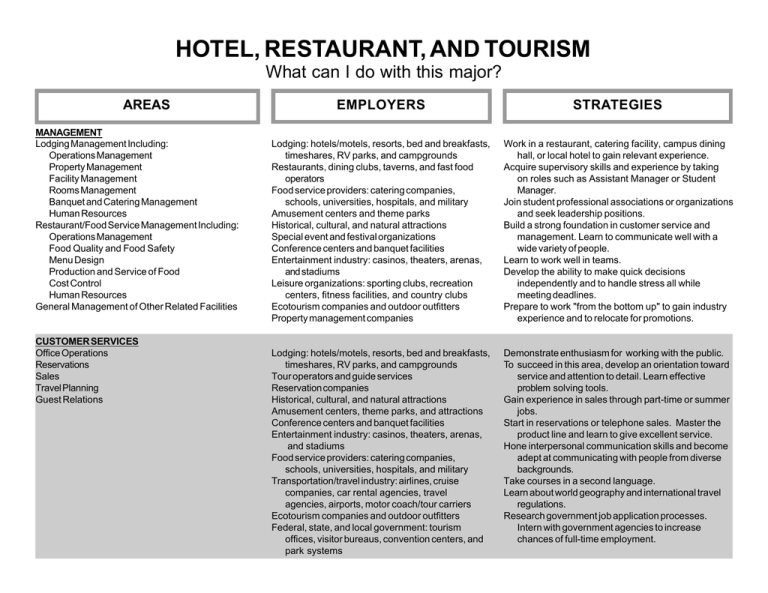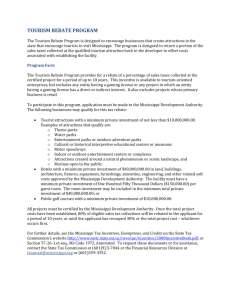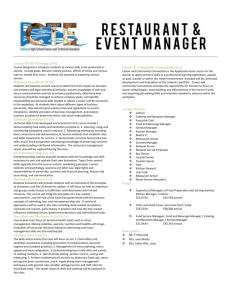HOTEL, RESTAURANT, AND TOURISM What can I do with this major? STRATEGIES AREAS
advertisement

HOTEL, RESTAURANT, AND TOURISM What can I do with this major? AREAS MANAGEMENT Lodging Management Including: Operations Management Property Management Facility Management Rooms Management Banquet and Catering Management Human Resources Restaurant/Food Service Management Including: Operations Management Food Quality and Food Safety Menu Design Production and Service of Food Cost Control Human Resources General Management of Other Related Facilities CUSTOMER SERVICES Office Operations Reservations Sales Travel Planning Guest Relations EMPLOYERS STRATEGIES Lodging: hotels/motels, resorts, bed and breakfasts, timeshares, RV parks, and campgrounds Restaurants, dining clubs, taverns, and fast food operators Food service providers: catering companies, schools, universities, hospitals, and military Amusement centers and theme parks Historical, cultural, and natural attractions Special event and festival organizations Conference centers and banquet facilities Entertainment industry: casinos, theaters, arenas, and stadiums Leisure organizations: sporting clubs, recreation centers, fitness facilities, and country clubs Ecotourism companies and outdoor outfitters Property management companies Work in a restaurant, catering facility, campus dining hall, or local hotel to gain relevant experience. Acquire supervisory skills and experience by taking on roles such as Assistant Manager or Student Manager. Join student professional associations or organizations and seek leadership positions. Build a strong foundation in customer service and management. Learn to communicate well with a wide variety of people. Learn to work well in teams. Develop the ability to make quick decisions independently and to handle stress all while meeting deadlines. Prepare to work "from the bottom up" to gain industry experience and to relocate for promotions. Lodging: hotels/motels, resorts, bed and breakfasts, timeshares, RV parks, and campgrounds Tour operators and guide services Reservation companies Historical, cultural, and natural attractions Amusement centers, theme parks, and attractions Conference centers and banquet facilities Entertainment industry: casinos, theaters, arenas, and stadiums Food service providers: catering companies, schools, universities, hospitals, and military Transportation/travel industry: airlines, cruise companies, car rental agencies, travel agencies, airports, motor coach/tour carriers Ecotourism companies and outdoor outfitters Federal, state, and local government: tourism offices, visitor bureaus, convention centers, and park systems Demonstrate enthusiasm for working with the public. To succeed in this area, develop an orientation toward service and attention to detail. Learn effective problem solving tools. Gain experience in sales through part-time or summer jobs. Start in reservations or telephone sales. Master the product line and learn to give excellent service. Hone interpersonal communication skills and become adept at communicating with people from diverse backgrounds. Take courses in a second language. Learn about world geography and international travel regulations. Research government job application processes. Intern with government agencies to increase chances of full-time employment. (Hotel, Restaurant, and Tourism, Page 2) AREAS SPECIAL EVENTS Convention and Trade Show Planning Convention Services Management Meeting Planning Entertainment/Event Planning Athletic Event Planning Programs and Activities Planning Children's Programming/Planning SALES/MARKETING General Sales Meeting and Convention Sales Incentive Travel Sales Media Planning and Development Public Relations Publicity/Promotions Market Research EMPLOYERS STRATEGIES Large hotels Resorts Amusement centers, theme parks, and attractions Special event and festival organizations Conference centers and banquet facilities Entertainment industry: casinos, theaters, arenas, and stadiums Athletic teams and organizations Cruise companies Leisure organizations: sporting clubs, recreation centers, fitness facilities, and country clubs Trade and professional associations State, federal, and local government: tourism offices, visitor bureaus, convention centers, and park systems Large corporations Take classes in business, commercial recreation, advertising, and public relations. Gain experience through planning activities and events for campus and community organizations. Work with summer conferences and youth groups that your university may host. Complete internships or work part-times jobs with local hotels, conference centers, and banquet facilities. Develop the ability to make quick decisions independently. Display good planning, organizational, interpersonal, and public speaking skills. Learn to think creatively. Attend conferences for student organizations and professional associations. Tour operators and guide services Historical, cultural, and natural attractions Lodging: hotels/motels, resorts, bed and breakfasts, timeshares, RV parks, and campgrounds Reservation companies Amusement centers, theme parks, and attractions Special event and festival organizations Conference centers and banquet facilities Food service providers: catering companies, schools, universities, hospitals, and military Entertainment industry: casinos, theaters, arenas and stadiums Transportation/travel industry: airlines, cruise companies, car rental agencies, travel agencies, airports, motor coach/tour carriers, and rapid transit (AMTRAK) Leisure organizations: sporting clubs, fitness/ recreation facilities, and country clubs Ecotourism companies and outdoor outfitters Trade and professional associations Federal, state, and local government: tourism offices, visitor bureaus, convention centers, and park systems Public or private corporations Take additional courses in marketing and advertising. Gain experience in sales and customer service through part-time or summer jobs and internships. Develop excellent interpersonal and public speaking skills. Learn to think creatively in order to develop unique marketing campaigns and sales techniques. Join student organizations and professional associations and volunteer for publicity committees. Attend conferences and trade shows. Start in reservations or telephone sales. Learn the product line and how to deal with travel agents and customers. Be willing to relocate to a major city like New York City, Los Angeles, Chicago, or Miami for more opportunities. (Hotel, Restaurant, and Tourism, Page 3) AREAS CORPORATE ADMINISTRATION Property Acquisition and Development Legal Services Research/Market Analysis Marketing Finance and Accounting Human Resources: Human Resource Management Recruiting and Training Employee Support Services Labor Relations Compensation and Benefits COMMUNICATIONS Writing Editing Research Electronic Media EMPLOYERS STRATEGIES Parent corporations for large chains of: Hotels, motels, and resorts Restaurants and fast food operators Food service providers Casinos Amusement centers and theme parks Attractions Fitness facilities Airlines Cruise companies Motor coach/tour carriers Rapid transit companies Assume leadership roles in student organizations and professional associations. Attend their meetings and conferences. Study the industry leaders and trends by reading trade journals. Gain experience in decision-making, planning, budgeting, and human resources through internships and summer jobs. Develop excellent interpersonal and public speaking skills. Prepare to work "from the bottom up" to gain industry experience. Be geographically flexible and willing to relocate for promotions. Create a network of contacts. Obtain a graduate degree in business, law, or a related field to increase opportunities for advancement. Self-employment/Freelance Newspapers, magazines, and trade journals Publishers: guide and travel books, travel newsletters Internet sites Video producers Tour operators Federal, state, and local government: tourism offices and visitor bureaus Study and gain an in-depth knowledge of industry trends. Take journalism or English classes to hone writing skills. Work for campus newspapers and other publications or write for organizational or departmental newsletters. Develop effective research methods and computer skills. Practice paying attention to detail and meeting deadlines. Study or work abroad while in school. Travel as much as possible in the United States and beyond. (Hotel, Restaurant, and Tourism, Page 4) AREAS EDUCATION Teaching Research Administration EMPLOYERS Colleges and universities STRATEGIES Gain professional industry experience. Attend and speak at conferences, trade shows and professional associations. Network in the industry for professional contacts. Determine an area of expertise. Gain an in-depth knowledge of that industry, its leaders and trends by reading recent books, journals, and annual reports. Develop strong writing and research skills. Maintain a high grade point average and secure strong recommendations for graduate school admission. Obtain a Ph.D. to teach at the university level. Some community colleges may hire candidates with master's degrees. GENERAL INFORMATION • Bachelor's degree qualifies you for entry-level industry and government positions. Master's degree qualifies you for community college teaching and advancement in industry and government. A doctoral degree is required for advanced research or teaching positions in colleges and universities and senior positions in government. • Join professional organizations such as The National Tour Association, The American Hotel and Motel Association, or The National Restaurant Association to stay abreast of current issues in the field and to increase networking contacts. • Obtain volunteer, part-time, summer, and/or internship experience at related organizations such as restaurants, catering companies, campus dining facilities, hotels, conference centers, recreational venues, and attractions. • Get involved with student travel groups or campus recreation committees that plan trips for other students. • Prepare to work your way up from the bottom. Gaining industry knowledge though work experience is highly valued. It may be necessary to move geographically to earn promotions. • Be willing to work on weekends, holidays, evenings, and long or unusual hours. • Develop strong communication and customer service skills. The ability to work well with all kinds of people in all kinds of situations is necessary to succeed. • Learn to pay attention to details and to demonstrate enthusiasm. Hotel guests and restaurant patrons expect excellent service. • Other important qualities for this field include working well in teams, handling stress, and meeting deadlines. • Take additional courses and/or travel abroad to gain a better understanding of world history, geography, customs, and international relations. Learn a second language. This will help you relate to more guests. © 1995 The University of Tennessee Prepared by the Career Planning staff of Career Services at The University of Tennessee, Knoxville. (1995, Revised 2000, 2005, 2009) UTK is an EEO/AA/Title VI/Title IX/Section 504/ADA/ADEA Employer



